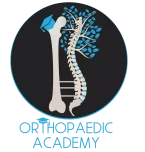Advanced Certificate Principles of Orthopaedics
Comprehensive Induction into the Specialty of Trauma & Orthopaedics
In association with
Taught by Our Faculty
Overview
The Principles of Orthopaedics course provides a comprehensive understanding of the fundamental concepts and practices in the field of orthopaedics.
The course covers topics such as anatomy and physiology, biomechanics, fractures and dislocations, joint replacements, and rehabilitation.
Participants will learn about different types of orthopaedic injuries, their causes, and the various treatment options available.
The course is delivered online through the Orthopaedic Academy LMS platform and is designed for healthcare professionals, students, and anyone interested in pursuing a career in orthopaedics.
This programme provides learners with the necessary knowledge and skills to effectively diagnose and treat orthopaedic conditions and to deliver optimal care to patients.
The course covers topics such as anatomy and physiology, biomechanics, fractures and dislocations, joint replacements, and rehabilitation.
Participants will learn about different types of orthopaedic injuries, their causes, and the various treatment options available.
The course is delivered online through the Orthopaedic Academy LMS platform and is designed for healthcare professionals, students, and anyone interested in pursuing a career in orthopaedics.
This programme provides learners with the necessary knowledge and skills to effectively diagnose and treat orthopaedic conditions and to deliver optimal care to patients.
Target Audience
- Medical Students
- Hospital Doctors : Foundation Doctors , Core Trainees , Trust Doctors , Clinical Fellows , Residents
- General Practitioners
- A&E doctors of all levels
- Useful aid to prepare for MRCS & MRCEM Exams
- Physiotherapists , Chiropractors and Osteopaths
- Advanced Nurse Practitioners
- Physician Associate
- All Healthcare professionals with an interest in Orthopaedics and Musculoskeletal care
Learning Outcomes
- Understand the anatomy and physiology of the musculoskeletal system
- Be able to diagnose and classify musculoskeletal injuries and disorders
- Become familiar with non-operative and operative treatment of musculoskeletal injuries and disorders
- Develop and implement rehabilitation programs for patients with musculoskeletal injuries and disorders
- Communicate effectively with patients, families, and other healthcare professionals about musculoskeletal injuries and disorders
- Learn some of the key practical skills
Summary
Feature | Details |
Delivery method | Self-paced, Online |
Content | Lectures, Quizzes, Case Studies and Summary Sheets |
Instructors | Experienced Orthopaedic Surgeons |
Assessment | Quizzes – Option to Retake |
Duration | 2 – 4 Months |
Certificate | 25 CPD Points |
Approvals | Royal College of Surgeons and Skills Development Council Canada and the CPD Group |
Programme of Modules
Trauma, Emergencies, and Oncall Section
- Surviving the Orthopaedic Oncall: Teaches how to manage common orthopaedic emergencies, such as fractures, dislocations, and spinal injuries.
- Upper Limb Fractures: Covers the diagnosis and treatment of upper limb fractures, such as humeral fractures, radial and ulnar, and wrist fractures.
- Lower Limb Fractures: Covers the diagnosis and treatment of lower limb fractures, such as femoral fractures, tibial fractures, and ankle fractures.
- Common Spinal Trauma & Emergency Spinal Conditions: This module covers the diagnosis and treatment of common spinal trauma and emergency spinal conditions, such as vertebral fractures, spinal cord injuries, and spinal infections.
- Common Paediatric Conditions, the Limping Child and Non-accidental Injuries: This module covers the diagnosis and treatment of common paediatric orthopaedic conditions, such as limping, non-accidental injuries, and developmental dysplasia of the hip.
- How to Approach a Pathological Bone Lesion/Fracture, such as a tumour or infection.
- Manipulation of fractures and dislocations and application of casts
- How to Survive and excel at the Trauma Meeting where orthopaedic surgeons discuss cases.
- Commonly Missed Orthopaedic Injuries: Covers commonly missed orthopaedic injuries, such as compartment syndrome and stress fractures.
Elective Orthopaedics Section
- Principles of Orthopaedic Examination: Teaches you the principles of orthopaedic examination, such as inspection, palpation, and range of motion testing.
- Common Elective Upper Limb Conditions: This module covers common elective upper limb conditions, such as carpal tunnel syndrome, rotator cuff tears, and tennis elbow.
- Common Elective Lower Limb Conditions: This module covers common elective lower limb conditions, such as osteoarthritis, rheumatoid arthritis, and anterior cruciate ligament tears.
- Spinal Examination and Common Elective Spinal Conditions: This module covers the spinal examination and common elective spinal conditions, such as scoliosis and spinal stenosis.
- How to Read a Radiograph: This module teaches you how to read a radiograph, which is an X-ray image.
- Aspiration & Injection of Knee & Shoulder joints: This module teaches you how to perform an aspiration or injection of the knee or shoulder joint.
- History & Principles of orthopaedic implants: This module teaches you about the history and principles of orthopaedic implants, which are devices that are used to replace or repair bones.
- Principles of consent: Teaches you the principles of consent, which is the process of obtaining permission from a patient to undergo a medical procedure.
- Orthopaedic Oncology: Teaches about orthopaedic oncology, which is the specialty of orthopaedic surgery that deals with cancer of the bones and joints.











